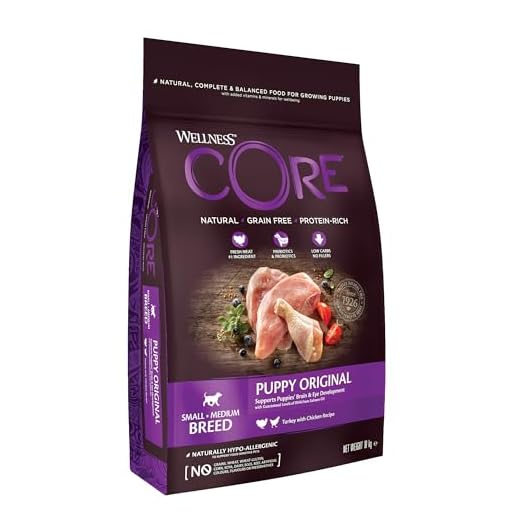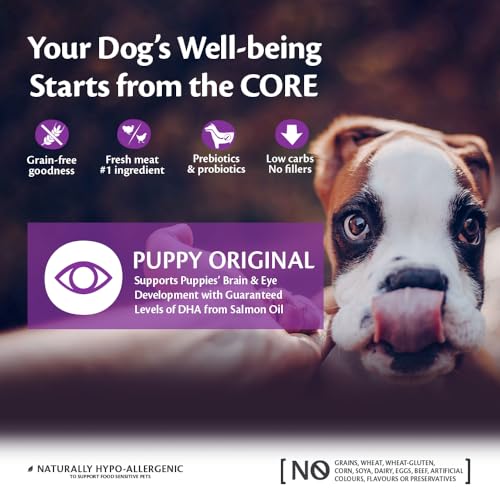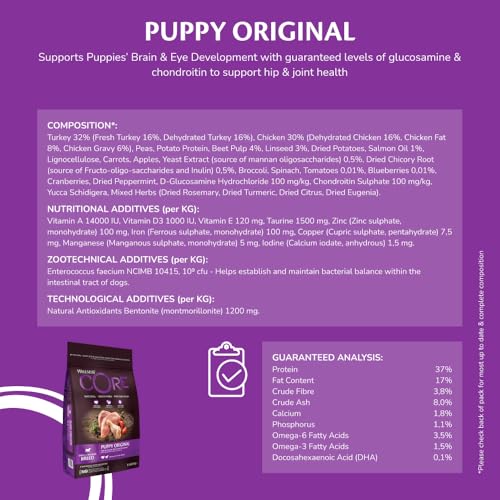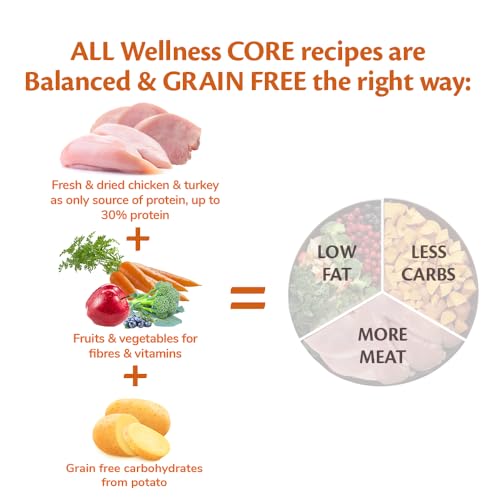




When I first brought home my Cavalier King Charles Spaniel puppy, I was determined to provide him with the best nutrition possible. I knew that the right food would not only support his growth and development but also contribute to his overall health and well-being.
After researching various options and consulting with my veterinarian, I discovered that the key to finding the best dog food for my Cavalier King Charles Spaniel puppy was to look for a formula specifically designed for small breed puppies. These formulas are typically enriched with essential nutrients like calcium, phosphorus, and DHA, which are crucial for healthy bone development and cognitive function.
Additionally, I made sure to choose a dog food that was made with high-quality ingredients and free from artificial additives and fillers. This ensured that my puppy was getting the nutrition he needed without any unnecessary or potentially harmful ingredients.
Nutritional Needs for Cavalier King Charles Spaniel Puppies
Cavalier King Charles Spaniel puppies, like all young dogs, have specific nutritional requirements crucial for their growth and development. One key need is for a diet rich in high-quality protein sources. These proteins are essential for building strong muscles and supporting overall development.
Another vital nutritional need for Cavalier King Charles Spaniel puppies is a balanced intake of fats. Fats provide a concentrated source of energy and are necessary for the proper development of their nervous system and brain function.
- Protein-Rich Diet: Ensure your puppy’s diet includes high-quality protein sources such as chicken, turkey, or fish.
- Essential Fatty Acids: Look for foods containing omega-3 and omega-6 fatty acids to support your puppy’s skin, coat, and overall health.
- Vitamins and Minerals: Provide a balanced diet rich in vitamins and minerals to support your puppy’s immune system and overall well-being.
Key Ingredients to Consider in Puppy Food for Cavalier King Charles Spaniels
When selecting the ideal puppy food for your Cavalier King Charles Spaniel, it’s crucial to prioritize ingredients that cater to their specific nutritional needs. Look for formulations that feature high-quality protein sources, such as deboned chicken or turkey, as the primary ingredient.
Additionally, ensure that the puppy food contains essential fatty acids, like DHA, which support brain development and overall cognitive function. These nutrients are especially important for young Cavaliers, as they are known for their playful and curious nature.
- Protein: Opt for formulations with real meat as the first ingredient to support your puppy’s muscle development and energy levels.
- DHA: Look for ingredients rich in DHA, such as fish oil, to promote healthy brain development and vision in your Cavalier King Charles Spaniel puppy.
- Whole Grains: Select puppy foods that incorporate whole grains like brown rice or oats for a good source of energy and fiber.
- Fruits and Vegetables: Choose formulas with added fruits and vegetables for essential vitamins, minerals, and antioxidants to support your puppy’s overall health.
Choosing Between Wet and Dry Food for Cavalier King Charles Spaniel Puppies
When it comes to deciding between wet and dry food for your Cavalier King Charles Spaniel puppy, there are a few factors to consider. Both options have their advantages and it’s important to choose based on your puppy’s specific needs.
Wet food, often referred to as canned food, contains higher moisture content which can be beneficial for puppies who may not drink enough water. It’s also generally more palatable, making it a good choice for picky eaters or puppies with dental issues.
- Palatability: Wet food is often more appealing to puppies due to its texture and smell.
- Hydration: The higher moisture content in wet food can help keep your puppy hydrated.
- Digestibility: Some puppies find wet food easier to digest, which can be beneficial for those with sensitive stomachs.
Dry food, on the other hand, is more convenient and cost-effective. It’s easier to store and can be left out for longer periods without spoiling. Additionally, the crunchiness of dry food can help promote dental health by reducing tartar buildup.
- Convenience: Dry food is convenient to store and can be left out without spoiling.
- Dental Health: The crunchy texture of dry food can help keep your puppy’s teeth clean.
- Cost-Effective: Dry food is often more affordable than wet food, making it a budget-friendly option.
Ultimately, the decision between wet and dry food depends on your puppy’s preferences, dietary needs, and your lifestyle. Some owners choose to feed a combination of both wet and dry food to provide a balanced diet.
Exploring Grain-Free Options for Cavalier King Charles Spaniel Puppies
As a proud owner of a Cavalier King Charles Spaniel puppy, I understand the importance of providing the right nutrition for my furry friend. When it comes to choosing the best food for my Cavalier King Charles Spaniel puppy, I always consider grain-free options.
Grain-free diets for Cavalier King Charles Spaniel puppies can offer several benefits. They are often easier to digest, which is important for puppies with sensitive stomachs. Additionally, grain-free formulas are less likely to cause allergies or food intolerances, which can be common in this breed.
- One of the top grain-free options for Cavalier King Charles Spaniel puppies is a formula that includes high-quality proteins such as chicken, turkey, or fish.
- Look for grain-free puppy foods that are rich in essential nutrients like omega-3 fatty acids, which are beneficial for your puppy’s skin and coat health.
- Consider a grain-free formula that includes ingredients like sweet potatoes, peas, or lentils as healthy carbohydrate sources that are gentle on your puppy’s digestion.
Transitioning Your Cavalier King Charles Spaniel Puppy to a New Diet
When it comes to changing your Cavalier King Charles Spaniel puppy’s food, it’s essential to do it gradually. A sudden switch can upset their stomach and lead to digestive issues. To make the transition smooth, start by mixing a small amount of the new food with their current food.
Over the course of about a week, gradually increase the proportion of the new food while decreasing the old food. This slow transition allows your puppy’s digestive system to adjust to the new food without causing any discomfort.
Monitoring your puppy’s response is crucial during this process. Look out for any signs of digestive upset, such as diarrhea or vomiting. If you notice any of these symptoms, slow down the transition process and give your puppy’s stomach time to adjust.
- Begin by mixing 25% new food with 75% current food for the first two days.
- On days three and four, mix 50% of each food.
- On days five and six, mix 75% new food with 25% current food.
- By day seven, your puppy should be ready to eat 100% of the new food.
Creating Nutritious Meals for Your Cavalier King Charles Spaniel Puppy
As a devoted pet owner, I understand the importance of providing my Cavalier King Charles Spaniel puppy with the best nutrition. One way I ensure my puppy’s health is by preparing homemade meals tailored to her needs. These meals are not only nutritious but also delicious, making mealtime enjoyable for my furry friend.
One of my favourite homemade dog food recipes for my Cavalier King Charles Spaniel puppy is a simple yet nutritious mix of lean protein, healthy fats, and fibre-rich vegetables. I start by cooking a lean protein source like chicken or turkey, then add in some cooked brown rice or quinoa for energy. I also include a variety of vegetables such as carrots, peas, and sweet potatoes to provide essential vitamins and minerals.
- Ingredients: Lean protein (chicken, turkey), brown rice, quinoa, carrots, peas, sweet potatoes.
- Instructions: Cook the protein source and grains, then mix in the vegetables. Serve at room temperature.
This homemade dog food recipe provides a balanced diet for my Cavalier King Charles Spaniel puppy, ensuring she receives all the nutrients she needs to grow and thrive. Plus, it’s a great way to bond with my pet and show her how much I care!
Understanding Common Allergens for Cavalier King Charles Spaniel Puppies
When it comes to my Cavalier King Charles Spaniel puppy’s diet, I need to be aware of potential allergens that could affect their health. Some ingredients commonly found in dog food can trigger allergic reactions in sensitive puppies like mine.
Proteins like chicken, beef, and dairy products are often culprits for allergies in Cavalier King Charles Spaniel puppies. These ingredients can cause skin irritations, digestive issues, and even lead to chronic conditions if not addressed.
- Chicken: While chicken is a popular protein source in many dog foods, it can trigger allergic reactions in some Cavalier King Charles Spaniel puppies. Symptoms of a chicken allergy can include itching, redness, and gastrointestinal upset.
- Beef: Another common allergen for Cavalier King Charles Spaniel puppies is beef. Allergic reactions to beef can manifest as skin problems or digestive issues.
- Dairy: Some Cavalier King Charles Spaniel puppies are lactose intolerant, which means they cannot digest dairy products properly. Feeding dairy products to these puppies can lead to gastrointestinal upset.
By understanding these common allergens, I can make informed decisions about my Cavalier King Charles Spaniel puppy’s diet and ensure they stay healthy and happy.
Recommended Brands for Cavalier King Charles Spaniel Puppies
When it comes to choosing the right food for my Cavalier King Charles Spaniel puppy, I trust the recommendations of veterinarians. They often suggest brands that are known for their high-quality ingredients and balanced nutrition.
One brand that comes highly recommended is Royal Canin. Their puppy formula is specifically tailored to meet the nutritional needs of small breed puppies like mine, providing the right balance of proteins, fats, and carbohydrates.
- Royal Canin: Tailored nutrition for small breed puppies, including Cavalier King Charles Spaniels.
Feeding Schedule and Portions for Cavalier King Charles Spaniel Puppies
Cavalier King Charles Spaniel puppies require a consistent feeding schedule to support their growth and development. It’s important to feed them at the same times each day to establish a routine. Puppies up to 12 weeks old should be fed four times a day to meet their high energy needs.
From 3 to 6 months, you can reduce feeding to three times a day. This helps in maintaining their energy levels and prevents them from overeating. After 6 months, you can transition to feeding them twice a day, which is suitable for their digestive system and overall health.
When determining the portion size, consider your puppy’s age, size, and activity level. A general guideline is to provide about 1/2 to 1 cup of high-quality puppy food per day, divided into meals. Monitor your puppy’s weight and adjust the portions accordingly to ensure they are growing at a healthy rate.
It’s also important to provide fresh water at all times and to avoid overfeeding, as Cavalier King Charles Spaniels are prone to obesity, which can lead to various health issues.
Tips for Picky Eaters: Getting Your Cavalier King Charles Spaniel Puppy to Eat
Having a picky eater can be challenging, but with some patience and creativity, you can encourage your Cavalier King Charles Spaniel puppy to eat a balanced diet. Here are some tips to help:
Firstly, it’s essential to establish a regular feeding schedule. Feed your puppy at the same times each day, and avoid leaving food out for free-feeding. This can help regulate their appetite and make meal times more predictable.
- Experiment with different types of food to find what your puppy likes. Some may prefer wet food, while others prefer dry kibble. You can also try mixing in some fresh, dog-safe fruits and vegetables for added taste and nutrition.
- Make meal times fun and interactive. Use puzzle feeders or interactive toys that dispense food to make meal times more engaging for your puppy.
- Avoid feeding your puppy table scraps or human food, as this can encourage picky eating habits and may not provide the balanced nutrition they need.
- Consult with your veterinarian if you’re concerned about your puppy’s eating habits. They can provide guidance on the best diet for your puppy’s specific needs.
By following these tips, you can help your Cavalier King Charles Spaniel puppy develop healthy eating habits and ensure they get the nutrition they need to thrive.
Best Dog Food For Cavalier King Charles Spaniel Puppy
Features
| Part Number | 10773 |
| Model | 10773 |
| Size | 10kg |
| Language | French |
Features
| Part Number | HARRGSFCP-10 |
| Model | HARRGSFCP-10 |
| Release Date | 2024-01-01T00:00:01Z |
| Size | 10 kg (Pack of 1) |
Features
| Part Number | DPDC70 |
| Model | DPDC70 |
| Color | Puppy (Chicken, Salmon & Peas) |
| Size | 7 kg (Pack of 1) |
| Language | English |
| Price history for Lily's Kitchen Natural Ingredients Puppy Food | |
|---|---|
|
Latest updates:
|
|
Features
| Part Number | 260976 |
| Size | 7.5 kg (Pack of 1) |
Q&A:
What is the best type of food for a Cavalier King Charles Spaniel puppy?
For a Cavalier King Charles Spaniel puppy, it’s crucial to choose a high-quality puppy food that is specifically formulated for small breeds. These foods usually contain the right balance of nutrients, including protein, fats, and essential vitamins, to support healthy growth and development. Look for options that list meat as the first ingredient and avoid fillers such as corn and soy.
How often should I feed my Cavalier King Charles Spaniel puppy?
Puppies generally need to eat more frequently than adult dogs. For a Cavalier King Charles Spaniel puppy, it’s best to divide their daily food intake into three to four meals a day until they are about six months old. After six months, you can reduce the feeding frequency to two meals a day.
Are there any specific dietary considerations for Cavalier King Charles Spaniel puppies?
Cavalier King Charles Spaniels are prone to certain health issues such as heart disease and obesity. It’s important to monitor their calorie intake and avoid overfeeding. Including omega-3 fatty acids in their diet can also help support heart health. Additionally, providing a diet that promotes joint health can be beneficial due to their potential for developing hip dysplasia.
























